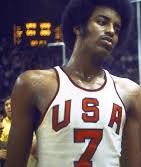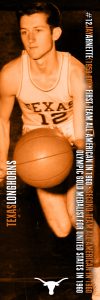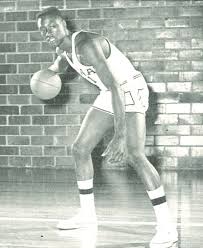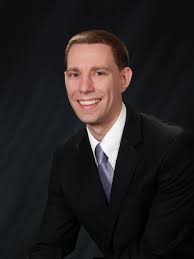The NBA Finals date back to 1947 (when they were known as the Basketball Association of America Finals) and the very 1st NCAA tourney was held in 1939. Olympic basketball competition is even older: it debuted as a demonstration event in 1904 and the men’s version became a medal sport in 1936, with the women finally getting their chance to go for the gold in 1976. The United States has dominated Olympic basketball competition from the start: the men have won 15 gold medals in the 18 tournaments they have participated in during the past 84 years, while the women have won 8 gold medals in the 10 tournaments in which they have competed during the past 44 years. Those of you who were looking forward to the 2020 Olympics opening ceremonies in Tokyo on July 24, 2020 will have to wait an extra 364 days, as the coronavirus caused a postponement until July 23, 2021. Due to the absence of college basketball since mid-March, HoopsHD’s Jon Teitel decided to fill the void by trying to interview as many prior Olympic players/coaches as possible so that you have something to read this summer while not watching the Summer Games. We continue our coverage by chatting with Tom/Greg/Pete Jr. about their father winning an NIT title in 1949, an NCAA title in 1959, and a gold medal in 1960. Today would have been Pete’s 105th birthday so we are honored to celebrate his memory.
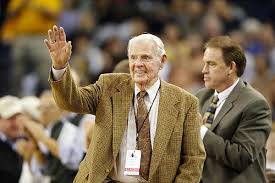
Your father was born in Vancouver, grew up in Los Angeles, and went to college at Loyola University: how close was he to his college classmate/fellow future Hall of Fame coach Phil Woolpert? Tom: He was the best man at Phil’s wedding and they are the 1st 2 players to win a title after playing for an Olympic championship coach (Jimmy Needles, coach of team USA at the 1936 Olympics). My dad/Phil were co-captains. Greg: My dad was born in Vancouver: the family moved there from LA before he was born due to scarce working conditions compared to what could be found up in Canada. The entire family moved back to LA when my dad was 3 years old after my grandfather found work there so his LA life started from that point forward. My recollection is that he met Phil in high school or while growing up in the neighborhood: before they ever became teammates at Loyola they had already formed a bond as lifelong friends. They played for 1936 Olympic coach Jimmy Needles. A neat sidebar: their “ballboy” (for lack of a better description) was future Hall of Fame coach Tex Winter! Pete Jr.: They were very close. After my dad graduated from high school he spent 2 years in the Merchant Marines and did 3 round-trips to China before starting college at age 20.
He spent several years in the Navy during WWII: what impact did his service have on him either on or off the court? TN: He did basic training in Chicago and then served in Great Lakes with other coaching legends like Red Auerbach/Tony Hinkle. I saved a box score from a game they played against another service team in a safe place: it is like a who’s who of basketball. GN: He was in the Navy during WWII and assigned to the same boat as Red Auerbach/Tony Hinkle. He and Red became lifelong friends during that time. Like a lot of WWII vets, my dad was pretty mum about what he experienced at sea: it was that ugly. He was on a cargo ship loading supplies for battleships and during conflicts everyone was put in peril. I recall that my dad became a 2nd Lieutenant and was discharged as one: honorably, of course. As for the impact, there was certainly some of that from an organizational standpoint. Once discharged from the Navy he was sent to San Francisco where he and my mom settled. Coach Needles had moved up to USF as their “Business Manager” (which was how it was termed then, as opposed to the modern title of Athletic Director). It was Coach Needles who convinced my dad to not only become a basketball coach but offered him the head coaching job at USF. My dad accepted if for no other reason than the fact that jobs were scarce for returning servicemen. My dad convinced Woolpert to become his assistant coach and was able to get him a coaching job at nearby St. Ignatius High School to help supplement his income. PN: He trained at Great Lakes just north of Chicago after enlisting in 1942. That summer my mom took a train back to Chicago to get married in front of her parents who were from Rockford, IL. My dad brought his best man: Red Auerbach. They got married on a Saturday and spent the 1st few hours of their wedding in the bleachers at Wrigley Field!
In the 1949 NIT title game as coach at San Francisco he was able to run out the clock to clinch a 1-PT win over Loyola IL: how big a deal was it to win an NIT title back in the day? TN: He got the job in San Francisco because Needles had become the athletic director there. My dad was also the baseball coach and only had a certain # of balls to use for the entire season: he hired 2 student managers to patrol each foul line to pick up any foul balls! He also coached tennis by having the best player run practices while he smoked a cigarette from the bleachers. He also coached golf so that he would also be able to coach his favorite sport: basketball. At that time the NIT was bigger than the NCAA tourney. He later left there to go to Michigan State for their very 1st Big 10 season, then got the job at Cal. GN: The 1949 NIT championship was huge for a lot of reasons. No West Coast school had ever won the tournament and the NIT was a bigger college basketball event back then than the NCAA tourney. The media coverage gave USF this “aura” that East Coast sportswriters ate up, and since my dad was so humble/grateful the media fell in love with him. PN: At the time the NIT was considered more prestigious than the NCAA, partly because it was held at Madison Square Garden. Kentucky won the NCAA tourney that year but lost in the 2nd round of the NIT. It was not until around 1954 when La Salle won it with Tom Gola that East Coast fans started elevating the NCAA tourney over the NIT. It was a huge deal in San Francisco when they won it: I remember a family photo of my parents at City Hall after a parade in a car that was given to him. Who could have guessed that 28 years later it was the same place where Mayor George Moscone was assassinated: Moscone was a freshman in 1949 and then transferred to Pacific to play basketball after my dad was hired as coach at Michigan State.
Take me through the magical 1959 Final 4:
In the Final 4 he had a 6-PT win over Cincinnati: how was he able to get the best of Oscar Robertson (who had 19 PTS/19 REB/9 AST)? PN: My father had 3 teams at Cal: freshmen/JV/varsity. 2 of his JV guys played important roles in 1959. The 1st was Bob Dalton, who loved basketball but came to Cal as a 6’3” tennis player. He ended up starting for the basketball team as a senior and was nicknamed “Thunderbird” due to the car he drove. The Final 4 had Cal/Cincy/Louisville/West Virginia. The Cal team took the floor 1st and Dalton walked up to Oscar and said, “Hi, my name is Dalton: what’s yours?” The following year my dad was coaching the College All-Star team at the Olympic trials in Denver. Oscar was the 1st person on the court shooting around by himself. My dad comes out and shakes hands with Oscar, who asked him why Dalton had asked him what his name was: it shows that Oscar held onto that memory for an entire year. My dad’s philosophy was to play defense before your guy had the ball rather than after he caught it. They made Oscar work to get the ball and then used some sagging help defenders to close off his driving lanes, which limited him to taking perimeter shots and getting to the foul line. My dad said that Oscar was the best player that he ever saw, even after seeing Michael Jordan.
In the title game against West Virginia Darrall Imhoff scored 10 PTS including the go-ahead basket with 17 seconds left in a 1-PT win (Jerry West had 28 PTS/11 REB): what did it mean to him to win a title, and how did the family/team/school celebrate? TN: He came home the next night and the whole neighborhood was excited. We painted the Cal mascot on a sign and wrote “Welcome home champs!” and hung it from my brother Pete’s window. Unfortunately the Cal band got home before my parents did so when they arrived the band was playing for them. I was not allowed to go outside because it was so late but it was 1 of those moments you never forget. PN: My father really believed in timeouts, which he went back and forth on with John Wooden. He uncharacteristically called a timeout about 8 minutes into the game to calm his team down while they were trailing by double-digits, but they came back to get a halftime lead. With about 10 minutes left in the game West Virginia coach Fred Schaus started playing a half-court 1-3-1 trapping defense and eventually took the lead. Imhoff shot the ball from the left side, missed a hook shot, and instinctively put it back in for the game-winner. On the plane ride the next day my dad was diagramming different ideas on napkins for how he could have better dealt with West Virginia’s trap. The 2 teams matched up again that fall at the LA Sports Arena. The 2nd JV guy was Tandy Gillis, who also became a senior starter and was known as a great corner shooter: he was like Larry Bird in those old 3-PT contests. Tandy’s shooting really helped them win the rematch, then they beat Iowa before losing to USC (but bounced back to beat the Trojans the following week in the conference opener).
In the 1960 NCAA title game he lost to Ohio State (Jerry Lucas had 16 PTS/10 REB): what did it mean to him to lose the title game 1 year after winning the title game? TN: After Cal won in 1959 there was a young coach at Ohio State named Fred Taylor who came out to Berkeley to visit my dad for a week that spring and go over Xs and Os. He was 1 of the best teachers of the modern game and shared his love for the game with others. Fred had 3 really good freshmen in Lucas/John Havlicek/Larry Siegfried so he asked my dad about teaching the mechanics of defense. Ohio State had a hell of a team, was well-prepared, and had 3 players who ended up in the Hall of Fame. At halftime they were down by 20 PTS at the Cow Palace. The manager used to pass out mimeographed copies of the stat sheet to the coaches. My dad came into the locker room and said it was the 1st team that he had ever seen a team with only 1 defensive REB…and then Imhoff raised his hand and said that the Buckeyes had only missed 1 shot! After the game at the press conference Fred was asked how he was able to dominate. Fred said, “I would not be here right now were it not for Pete Newell”. He admired my dad’s teams and wanted to learn from him. Ohio State lost to Cincinnati the following year in the 1961 title game. I do not know too many college coaches today who would help another coach right after winning a title. PN: They had to play Cincinnati again in the Final 4: I remember watching it. Oscar came out, took of his warmup jacket, and made 27 shots in a row. He missed #28 just as the Cal team was running onto the court. Oscar had hoped to intimidate Cal by showing that this was going to be a new year, but it took Cal about 5 minutes to reach the court. Cal won by 8 PTS to advance to the title game vs. the Buckeyes at the Cow Palace. By the time they got back to the hotel it was about 2:30AM: the team had not eaten since before the game so they spent about 45 minutes trying to find a restaurant that was open all-night. My dad wondered whether to let his team sleep in or not: he chose not to and regretted it after Ohio State opened up a 20-PT lead in the 1st half.
He coached team USA (including legends like Lucas/Robertson/West) at the 1960 Olympics: how did he get the job, and what did it mean to him to win a gold medal? TN: He got involved with USA Basketball after getting to Cal so he got invited back to work at training camps during the off-season. Back then the AAU teams were comprised of former college players who had real jobs and it was very popular. Imagine men barnstorming across the US playing regional tourneys well into their 30s. Phillips 66 hired some players and kept them on their team and several other teams in the Midwest followed suit. He did some clinics together with Woolpert in South America around 1957/1958. Bill Russell was on 1 of the teams that my dad coached. My dad worked with every single great post player from 1957-2004 (Kareem Abdul-Jabbar/Bill Walton/Wilt Chamberlain/etc.). PN: The day after the 1960 NCAA title game we avoided my dad in the living room while he was lost in thought. My dad did not want to coach the College All-Stars at the Olympic Trials in Denver but my mom spent all day convincing him to do so. The winning Olympic coach in 1936 was Jimmy Needles, who coached my dad in college and later hired my father as a 5-sport coach at USF. He made $24,000 and said that since the Jesuits take a vow of poverty and they expected him to live by that. The Finals took place on a Saturday between the AAU Phillips 66ers and the College All-Stars. The AAU team had older guys in their prime who said some degrading things about the 19 and 20-year old kids. My dad passed around the newspaper quotes at breakfast and then went outside for a smoke. He saw West across the street having an animated conversation with a clothing store mannequin. My dad walked up to West a couple of minutes later and asked him what he was doing. West said he had played poorly that week and was distressed that he had not honored his brother who had previously died in combat. My dad explained that if they beat Phillips then they would get to go to the Olympics. My dad later told Oscar to get the ball to Jerry early on…and Jerry scored 27 PTS in the 1st half! The Amateur Basketball Federation leaned very heavily toward AAU teams so a couple of AAU guys made the Olympic team, which prevented perimeter players like Lenny Wilkens from making it. I remember hearing my dad talking to the team at West Point in August of 1960: they were out of shape, out of season, and playing with a different ball/rules. The team was forced to eat in a rigid military format. Oscar was always the 1st person on the court and took 2-handed shots despite taking 1-handed shots in college: I would rebound for him while he got used to the new ball. He was very proud of winning a gold medal: back then coaches were given a bronze medal since they were considered professionals so when he brought it home to show it to us we were disappointed! That Olympic team played 4 exhibitions around the US: they lost to the ABL champion Cleveland Pipers in their 1st game, which did not make my dad a happy camper, so he held an early-morning practice the next day. He loved watching Friday night boxing and got to spend some time with Olympic boxing coach Julius Menendez. Julian told him about 1 of his young fighters: a kid by the name of Cassius Clay. I remember Oscar getting a rebound against the Russians while Lucas was cutting toward the basket. Oscar threw a behind-the-back pass to Lucas for a dunk, which was a key play because Russia was never the same team after that.
He remains 1 of only 3 coaches to win NCAA/NIT/Olympic titles (along with Bobby Knight/Dean Smith): what was his secret to winning so many championships? TN: I do not know if it was a secret. He was just honest with his players and once they stepped onto the court it was all business. They played for each other and would read/react/attack. Now the game is predetermine/attack/hope it goes in. I heard this over 50 years ago when he was talking to a coach on the phone: “In the world of basketball today there are thousands of coaches but very few teachers: you have to be yourself”. PN: Attention to detail: it starts on defense and then you have to share the ball on offense with an unselfish passion. He would have 2 players score in double-figures on a Friday night and then 2 different players score in double-figures the following night. Conditioning was also very important to everything that they did. Everyone on his college teams had a role so even if you were not in the top-8 or 9 in the rotation you could still contribute in practice. If you were not thinking then you were not using all of your abilities to play the game the right way.
He retired from coaching in 1960 at age 44 due to the stress and hero-worship involved with being a coach: what was the reaction like from the public, and did he have any regrets? TN: In 1959 he was diagnosed with a spot on his lung and they said if he did not stop smoking then he would not live to see me graduate from high school. He stopped cold turkey after the Olympics and lived until he was 1992. I do not know about regrets: we were told by our mom that he had to retire if he wanted to live. He had offers to go back into coaching ever year. He left Berkeley due to all of the civil unrest that was going on and a suspended athlete who took a verbal shot at my dad. My father was never into seeing his name in the paper: when the mainstream media wanted to get a rebuttal from him he did not see the need for it. He loved his coaches/student-athletes and had loved being on campus before that. He had a lot of other positive things going on at the time. PN: He had no regrets at all. I was 16 when he made the announcement. We would go to the games and sit about 10 rows behind the bench for the home games that started at 8:05PM. My dad would smoke a couple of cigarettes in the training room before walking along the baseline under the basket and shaking the hand of his predecessor Nibs Price before arriving right before the player introductions at 8PM. After he announced his retirement there would be a lot of people in the arena who started clapping when he walked in. His final home game was against Stanford: not only were all the fans and his own team clapping, but the Stanford stopped its own warmups to clap for him. Tokyo was selected to host the 1964 Olympics and they called up my dad in 1961 to see if he would come work with their national team. He ended up going abroad to work with the Japanese team at least once/year for the next 4 decades. That filled the void of not coaching but he certainly did not miss coaching college kids and never considered going to the pros.
After his coaching career ended he ran a free world-famous instructional basketball camp and served as a consultant/scout/executive for several NBA teams: why did his camp focus on big men, and how was he able to trade Elmore Smith/Brian Winters/Dave Meyers/Junior Bridgeman to Milwaukee for Kareem Abdul-Jabbar/Walt Wesley when he was GM of the Lakers in 1975?! TN: The offensive game is predicated on spacing. Tex Winter was 1 of the assistants on my dad’s high school team back in the day and my dad mentored Tex. Tex turned my dad’s offense into the triple-post…which worked well for the Bulls when they won 6 NBA titles in the 1990s! Each coast looked down on the other coast. When you look at all of his administrative positions after coaching you can see that he had a big hand in changing the sport: he realized that the post player would become an effective fundamental player who did not have to worry about dribbling. He noticed that footwork was not being taught but if you look at the footage he worked on the 2-man game with guys away from the basket about how to slip/seal. If you look his big men never took more than 2 dribbles before shooting/passing. He was so far ahead of the game with 6’10” players out on the wing. He had free camps for more than 600 players. It takes 2 people to make a deal work and the sticking point was that Kareem did not like Milwaukee and thought that he could do more for social justice globally by being in LA. Kareem met guys like Russell/Jim Brown but the guy who impressed him the most was Muhammad Ali. People do not realize how pivotal a figure he was beause he never sought any accolades/attention: he just wanted to help the homeless/downtrodden and was a different cat. PN: The camp started after Kermit Washington was drafted by the Lakers. At American University Kermit did most of his scoring with his back to the basket, but after the Lakers acquired Kareem he realized that he would have to change his skill set. The original group of big men was Kermit and a high school kid named Kiki Vandeweghe: they focused mainly on their footwork. Kermit came back the following season and was able to face the basket before attacking: people could not believe how much he had improved. Elmore joined the group the following summer, then it jus spread via word of mouth and kept getting bigger and bigger. He would have a 3-hour quarter-court session with 20 guys in the morning and then bring in 20 more guys in the afternoon. Players would come to LA because it was a nice place to spend a couple of weeks in the summer and the price was right (free!). Around 1993 the camp was later moved to Hawaii but fewer players wanted to attend for whatever reason so he later moved it to Las Vegas and started working more with college players. After Kermit retired he helped run the camp and then Chaminade coach Merv Lopes stepped in during the Hawaii era. I think the camp really helped resurrect the career of Bernard King, who was persona non grata after being dropped by Utah in the early 1980s. A go-between asked my dad if Bernard could attend and my dad said yes. The 1-on-1 games between Bernard and Kiki were amazing. The Warriors signed Bernard, and he eventually went to the Knicks and became a Hall of Fame-caliber player. The players themselves sold the camp: when other guys saw how well someone had improved after attending the camp they would want to go there themselves. It was not just All-Stars who could participate: he accepted anyone who indicated interest. My dad was very good friends with Wayne Embry and there were rumors that after Kareem’s rookie contract was up he would head back to his hometown to play for the Knicks. Wayne knew that he could not keep Kareem but did not want him playing for another team in the Eastern Conference. The Lakers had a lot of good young players so both teams got what they wanted. Lakers owner Jack Kent Cooke later moved to Las Vegas: you can imagine that it is not easy to be a GM when your owner is living in a different state! My dad later allowed Gail Goodrich to leave via the expansion draft and caught holy hell for it from the LA media. However, the NBA awarded New Orleans’ 1st round pick 3 years down the line to the team of whichever player it selected 1st. New Orleans took Gail in 1976, the Lakers got their 1st round pick in 1979, and they took a guy named Magic Johnson!
In 1979 he was inducted into the Hall of Fame as a contributor and in 2010 he was posthumously inducted as part of the 1960 Olympic team: when people look back on his career, how do you think that he should be remembered the most? TN: He was a caretaker of the game and a genuine coach who cared. His other great quote is “Coaching lasts a season…teaching lasts a lifetime”. PN: As a caretaker of the game on so many different levels and an innovator. First and foremost he was a teacher who relished everyone in the basketball world. 100 years ago “guards” got their name from sprinting down the court to guard the basket, while the taller/slower “forwards” would pick up the opponent’s guard as the forward line of defense. In the late 1940s my dad had a Friday night game vs. USC where he started a pair of 5’7” guards, a pair of 6’6” forwards, and a center named Don Lofgran. Many guys on that USF team were WWII veterans who had real combat experience. My dad decided to have his 2 big guys do a full-court press…and USC’s 6’3” guard dribbled right around them as the Trojans won by 20 PTS. The next morning he told the team that they would try a new game plan that night with the guards pressing and the forwards staying back: it worked great and he stuck with it the rest of his career. When he later went back East for the NIT it seemed like everyone was using it. I found out many years later that the 6’3” USC guard was Hall of Famer Bill Sharman! My dad would never tell stories about his accomplishments but rather only tales where he was the butt of the joke.



